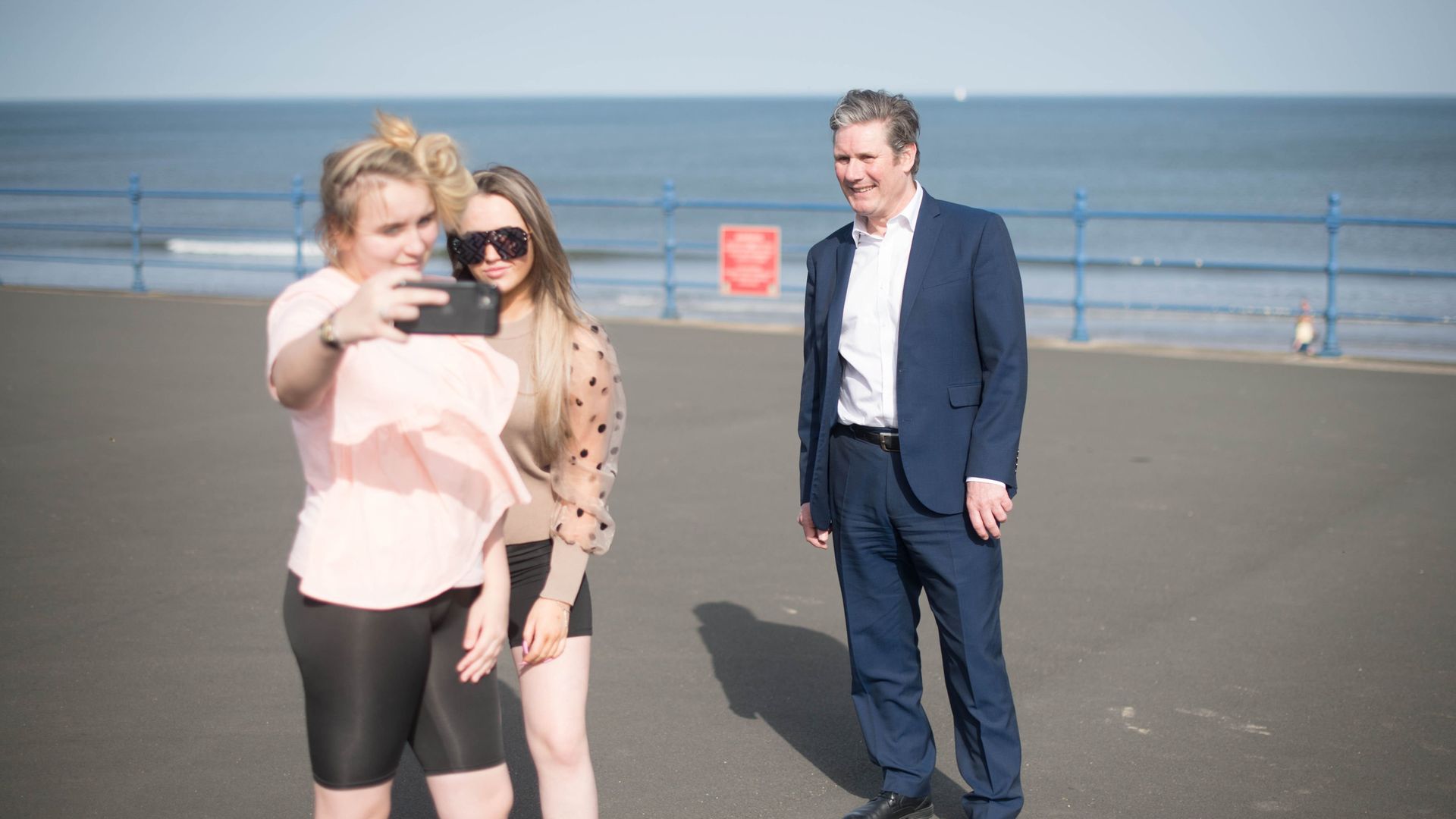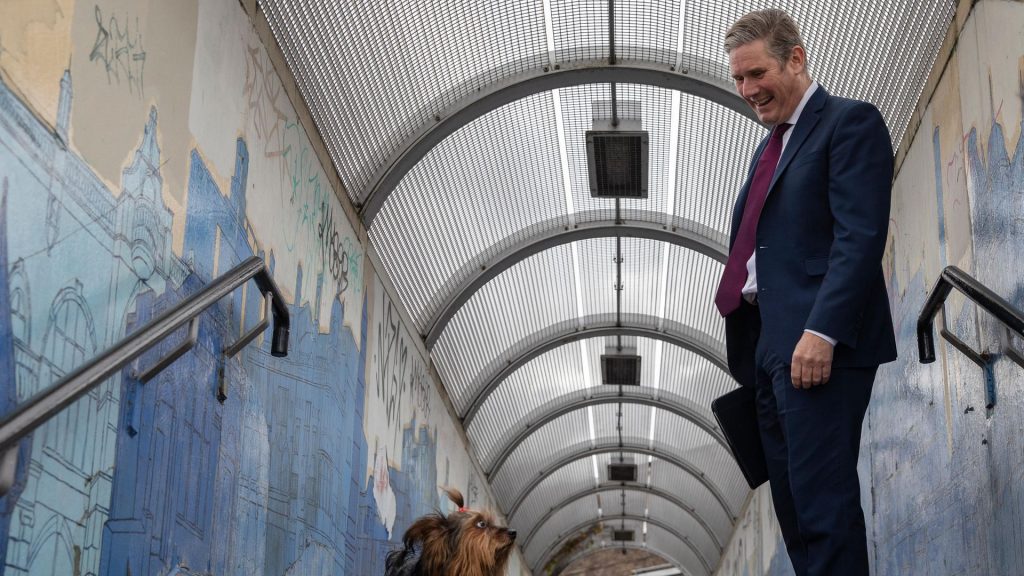
A year into his leadership, being ‘not-Corbyn’ is not enough. The Labour leader has to be visibly ‘post-Boris’.
Here is some advice for the leader of the Labour Party from an unexpected source: “It’s odd, the Keir Starmer thing: he’s articulate, intelligent, good in the Commons, lots of common sense. But, for some reason, he is not cutting through at all. The second year is difficult: the press gets bored, and only has two narratives – success or failure. Meanwhile, you have to focus on the day job – opposition – and the real job – thinking deeply about what you would do differently in office, and why. What you are actually for. You have to do both. Fail at the first and your ‘supporters’ will never let you get on with the second. I think the world we live in has made it even harder. There is so much shouting about who said what on Twitter that, as Bob Dylan sang, there is ‘No Time to Think’.”
This unsolicited analysis comes from – how to put this? – a source close to David Cameron, the last leader of the opposition to make it to Number 10. That was 11 years ago and the Conservatives have been in power ever since, as Labour has suffered four successive defeats, culminating in Boris Johnson’s crushing victory in 2019 – Labour’s worst general election performance since 1935. So perhaps Starmer should heed the advice of this unexpected guide to what lies ahead of him.
This week he begins the second year of his leadership, a phase which – even in normal circumstances – is an uphill battle for an aspiring prime minister. And these are scarcely normal circumstances.
Starmer’s victory over Rebecca Long-Bailey and Lisa Nandy in last year’s leadership contest was decisive, but dismally overshadowed by the first national lockdown, imposed only 12 days before. Accepting victory in a pre-recorded speech posted on social media, he was denied the burst of energy, media hype and tribal celebration that are the standard spoils of triumph in such a race.
This was a portent of things to come. In positioning himself as a constructive critic of Johnson’s pandemic strategy, Starmer has insulated himself from the charge of opportunism – but also risked political anonymity. “It may have been very noble and high-minded of Iain Duncan Smith to support Blair on the war on terror in 2001, and not to score cheap political points,” says one left-wing MP. “But sometimes cheap political points are the best you can hope for. And look what happened to Duncan Smith [sacked as leader by his own party in 2003]”.

This critique is not confined to the Labour left. As one shadow cabinet supporter of Starmer puts it: “I don’t hold with this view that patriotism requires Keir to pull his punches over Covid. There are 126,000 dead, and many of those deaths could have been avoided if Boris hadn’t mangled it. Sure, you can’t be seen to be clambering over corpses to sell a soundbite. But you have to make your mark in a crisis like this, not disappear from view.”
Labour’s nerves are undoubtedly jangled by a recent dip in the polls (according to one survey last month, Johnson’s net approval rating is now 10 points ahead of Starmer’s). But it is votes that count, and on May 6, Starmer faces his first electoral test.
There is the Hartlepool by-election forced by the resignation of Mike Hill over allegations of sexual harassment (which he denies): the seat has been solidly Labour since its creation in 1974 – but is now firmly in the Conservatives’ cross hairs.
There are local elections across England; 13 mayoral contests – including Sadiq Khan’s bid for a second term in London – and elections to the Welsh assembly and Scottish parliament. Labour, under new management north of the border since Anas Sarwar’s recent election as Scottish leader, badly needs to improve its present tally of 23 seats at Holyrood, behind the SNP and the Tories. Without a significant recovery in Scotland, the party stands little chance of winning power at Westminster.
Three things struck me as I researched this piece. First, that there is near-universal recognition – even among some of Jeremy Corbyn’s supporters – that Starmer is a decent, competent politician, surrounded by decent, competent advisers. In testing circumstances, this alone has saved the party from the clear and present danger of political oblivion: no small achievement in the testing circumstances of a pandemic.
In particular, he has made significant strides towards cleansing Labour of the stain of anti-Semitism. In June, when Long-Bailey retweeted an article claiming that the US police officers who had killed George Floyd learned their tactics from the “Israeli secret services”, he sacked her from the shadow cabinet.
More remarkably, when Jeremy Corbyn responded to the report of the Equalities and Human Rights Commission in October on Labour anti-Semitism by claiming that the problem had been “dramatically overstated”, Starmer suspended him from the party that he had led only six months previously.
Second, that almost nobody, even Starmer’s cheerleaders, wanted to go on the record. There is disproportionate terror that even too much public praise of the leader might rock the Labour boat; that (in spite of having suspended Corbyn) Starmer cannot be seen to crow too loudly over his left wing adversaries, or even to relish Johnson’s mistakes too keenly.
Roy Jenkins famously compared Blair’s leadership to the task of a man carrying a Ming vase across a highly polished floor. But this is not just the usual balancing act of a centre-ground Labour leader. It reflects a reticence at the apex of the Labour party that sometimes borders on aphasia. There is a difference between offering reassurance, and choosing vanilla as a way of life.
Third: though Starmer has not yet been leader for a year, there is a growing fear that time is running out. The standard line from the Labour leader’s inner circle is that the next general election will probably not be held until 2024; that it is pointless to define Starmer in too much detail while the nation is battling Covid; and that squaring up to Johnson will be very different once the adult population is vaccinated and the economic price of the pandemic – and Rishi Sunak’s measures to get us through it – start to bite.
But this is to underestimate the speed with which the voters make their mind up about a leader. Peter Mandelson – now informally advising Starmer – used to say that the public decides in the first six months. Duncan Smith reckoned that he had half that time to make an impression when he became Tory leader in September 2001 (unfortunately for him, he was right).
The predicament facing Starmer is well-described by Deborah Mattinson, founding director of the research agency, BritainThinks and author of Beyond the Red Wall, an analysis of the Tories’ capture in 2019 of Labour strongholds in the north and Midlands.
About a year after the last general election, the pollster returned to the scene of the party’s destruction. “Asked to sum up Labour,” Mattinson tells me, “the words most often chosen were ‘invisible’, ‘absent’ or ‘quiet’. That Labour was under ‘new management’, as Keir Starmer himself puts it, was acknowledged, and seen as a good thing, but what that ‘new management’ actually planned to do left many genuinely baffled. Julie, a cleaner from Darlington, urged Starmer to ‘show us what he’s passionate about’, while Colin, a builder from Stoke, advised him to ‘pick his fights with care so we can see his priorities’. Labour’s task is to show Red Wall voters what Ian from Accrington described as ‘a Britain they want to see and a Britain they can believe in’. This vision must find an expression that is tangible, credible, and distinctive. Labour now lacks the luxury of time and must act fast before voters adopt a settled view that there’s no point in glancing in Labour’s direction. Nothing to see there.”
These charges are echoed within the Westminster village, where genuine affection for Starmer in Labour’s upper echelons is matched by exasperation and, in some cases, panic. There is admiration for the party leader’s forensic skills and strong ideals as a human rights lawyer. But this background is also seen as the origin of his vulnerabilities.
“Being a good barrister is very different from being a good politician,” says one supporter of the Labour leader. “You need guile and brutality as well as command of your brief. Look at Attlee and Wilson and Blair – the winners, in other words. They were cunning bastards.”
A common criticism of Starmer is that he believes too deeply in the power of rational argument – an odd accusation, you might think, until you remember who presently sits in Number 10, and how he got there. “You need wit and swagger to get the top job,” says one former Labour minister. “Not everyone has it instinctively, like, say, Tony or Barack Obama. But you can acquire some of those skills by practice and training, to a greater extent than people think. Cameron became much more charismatic as he evolved in parliament. It’s a matter of priorities – and you have to ask if Keir sees that whole side of politics as priority. I mean, can you even imagine him presenting Have I Got News For You?”
The corollary is a much bigger question which relates to the scale of Starmer’s vision and ambitions for the country. For a start, there is concern that he is too assiduously following the New Labour playbook of taming the unions and keeping business happy: a blueprint that was right for the 1990s but is not necessarily transposable to the 2020s.
According to one senior veteran of the Blair years: “You don’t need to do the prawn cocktail circuit in quite such a grovelling way anymore. People’s attitude to business has changed radically in the past 25 years. When Tony was trying to become prime minister, we knew that business hostility could kill us. And it’s still true that a concerted attack on Keir by the CBI or IoD, or turbulence in the markets at the prospect of a Labour victory could do us damage. But it’s pre-crash, pre-Brexit thinking to imagine that the corporations can just decide who sits in Number 10. It’s no accident that Boris said “f**k business”. It’s no longer unsayable. In fact, it plays quite well if you do it right.’

In this context, some Labour moderates think it was a mistake by Anneliese Dodds, the shadow chancellor, to oppose rises in corporation tax in anticipation of Rishi Sunak’s second Budget on March 3. “The problem is not that she and Keir are specifically wrong about this,” says one former leadership contender, “but that it makes them look so cautious and timid. And the one thing an opposition party exiting a pandemic can’t afford to seem is cautious and timid.”
To be fair to Starmer, he often frames the challenge and opportunity facing the party in 2021 in audacious terms, with reference to the postwar reshaping of Britain – the implementation of the Beveridge Report on the welfare state, the foundation of the NHS, the radical increase in social housing. “I believe there’s a mood in the air which we don’t detect often in Britain,” he said in February. “It was there in 1945, after the sacrifice of war, and it’s there again now. It’s the determination that our collective sacrifice must lead to a better future.”
In his Labour conference speech in September – delivered online, of course – he warmed to the theme. “In 1945, Attlee had to build a society fit to reward the sacrifices of the war,” he said. “In 1964, Wilson had to make the ‘white heat of technology’ work for working people. In 1997, Blair wanted to extend the new era of opportunity to everyone. We need to be thinking about the questions of 2024 and the 2030s, not the questions of the past. If anything, Covid has quickened the pace.”
There persists, however, a nagging sense that this broad rhetoric has yet to be matched by any evidence of strategy, or readiness to launch a full-scale battle of ideas. Opposition parties that go on to win usually have a gravitational pull, gathering around them a milieu of strong-willed advisers (official and unofficial), think tank experts, sympathetic figures from tech, business and the arts, intrigued celebrities: there is no such milieu around Starmer, no buzz of energy and excitement.
This, his aides counter, is the product of the pandemic. But is it? Would there be a Starmer-lot of vivid personalities, courtiers and young meteors around this particular Labour leader, were it not for lockdown? One has to wonder.
Where, for instance, is Starmer’s Seumas Milne or Dominic Cummings, the Svengali the media loves to hate? Where are the articles headed: “The Second Most Powerful Person in the Labour Party”?
Nobody denies that Morgan McSweeney, Starmer’s chief of staff, or Chris Ward, his political adviser, or Ben Nunn, his communications director, are able operators, who have remained true to the principle that, on the whole, the adviser should never become the story. But it is possible to take this principle too far. In theory, these are the individuals that would staff Starmer’s Number 10. And it is positively odd – in the goldfish bowl world of modern media – that their profile is so low.
As Stella Creasy, the MP for Walthamstow (still seen by some as a potential party leader) has put it: “It would be an error to presume that left wing concerns – injustice, inequality and the fatality of inaction in the face of such issues – automatically cut through. At crucial moments of crisis, the left has repeatedly failed to construct the dominant narrative… Four elections have been lost. If there is one lesson, it’s that politics after this crisis will not be derived purely from circumstance, nor from meanings which ‘feel’ inevitable following such a traumatic period. It will be a product of contestation, of competing accounts. And we cannot waste time.”
Ironic to see Labour moderates such as Creasy effectively resurrecting the old Marxist idea of the “dialectic”. But she has a point. To prevail, as she implies, Starmer will have to pick and win fights: not according to the old battle-lines of the New Labour era, but around the big themes that will define the 2020s and beyond.
The role of government in the 21st century, the need for a wealth tax, climate emergency, the inequalities intrinsic to globalisation, intergenerational justice, the challenge of automation and AI… the inventory is not hard to draw up. The question is whether Starmer has the brio to take it on.
It is not enough to be “not-Corbyn”. He has to be visibly, impatiently “post-Boris”. In this respect, as more than one Labour source put it to me, the Labour leader is running against Rishi Sunak as much as against the prime minister himself: trying to stake his claim to be what the American commentator Michael Lewis would call the “New New Thing”.
“Just you wait,” says one of his aides. Great things are promised for the 2021 party conference in September which, if vaccination roll-out proceeds to plan, will be held in Brighton, at least partly as a physical event with an auditorium of activists (presumably still socially-distanced).
Here, I am told, we shall see the real Keir Starmer. No metaphoric barrister’s wig, no pandemic-induced caution, no punches pulled: Keir, unplugged, and unleashed.
And not a moment too soon. Modern politics is mercilessly dominated by first impressions. There is no question that Starmer truly believes he can become prime minister. But if that’s the case, he has to get real, really fast.
“It will stand or fall on one thing, and one thing alone,” says a close ally of the Labour leader. “Does he realise that, less than a year in, he’s already in the last-chance saloon?” Or, as that source close to David Cameron puts it more pithily: “What is Starmer for?”
This article was originally published by Tortoise, a different kind of newsroom committed to a slower, wiser news. To try Tortoise, New European readers can get a 30-day free trial and a special half price offer: just go to www.tortoisemedia.com/friend/trial and enter the code TNE50. You’ll get access to all of Tortoise’s investigations, live editorial meetings, audio articles and daily news briefing emails.
What do you think? Have your say on this and more by emailing letters@theneweuropean.co.uk









